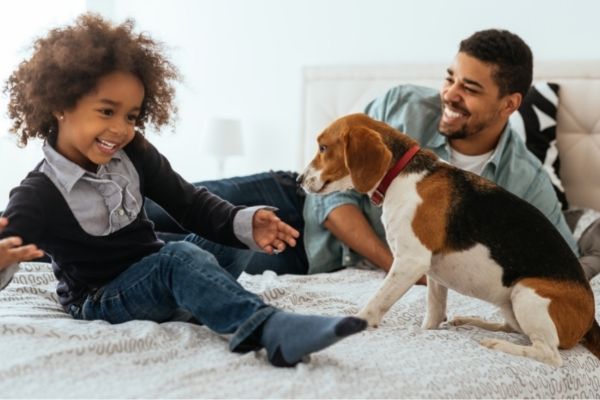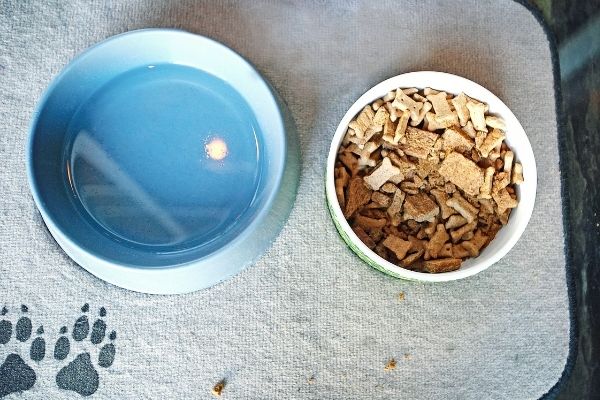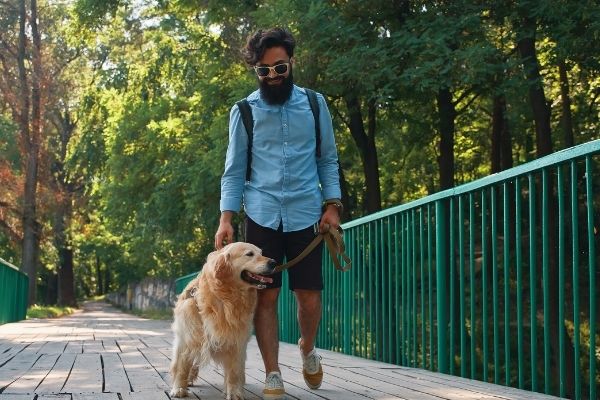
In Part 1 of this 4-part series, we explored whether to adopt a puppy or an adult dog.
We asked several questions to help you assess the type of canine companion that will best fit your lifestyle, energy level, and schedule.
Whether you welcome a puppy or adult dog into your family, your new pet will likely be scared, anxious, or cautious. During the transition period, be extra patient and be prepared to do extensive training (or retraining).
Put yourself in your dog’s shoes – er – paws.
Imagine that you’ve just moved into a new home in a place you’ve never been before, and are being cared for by people you’ve never met. That scenario is both exciting and stress-inducing.
Resist the temptation to invite your family and friends over to meet your new fur baby, as this can overstimulate and overwhelm your dog. Instead, give your dog time – anywhere from days to weeks – to get used to the new sights, smells, and sounds and to bond with you.

The settling-in period will be exhausting for your dog, so give them a quiet, private place to take extra naps and get comfortable with their new surroundings.
Before your dog comes home, make the following four decisions:
1. Where will my dog sleep?

Create a safe, cozy doggy den dedicated solely to your dog. This may be a blocked-off area, room, or a sofa. It may be a crate.
About half of all pet owners share their bedroom or bed with their dog.
While your dog will likely be delighted to co-sleep with you, before establishing that habit, understand that it may aggravate your allergies.
Dogs are lighter sleepers than humans with an average of three wake/sleep cycles per nighttime hour. Humans, on the other hand, have one sleep cycle every 24 hours. Co-sleeping with your dog, while comforting to both of you, may negatively affect the quality of your sleep.
2. Where will my dog eat and drink?

Designate a feeding area that is not a high-traffic location – perhaps near your dog’s crate or in a quiet corner, away from children and other pets. Dogs can be protective of their food, and you don’t want them to become aggressive about guarding it.
Since dogs are messy eaters, it’s wise to feed them in a non-carpeted area. Put an easy-clean mat beneath their food and water bowls.
After your dog finishes eating, remove and thoroughly clean the feeding dish. Be sure to replenish the water bowl with fresh water throughout the day.
3. Where will my dog go potty?
 Whether you adopt a puppy or adult dog, expect accidents during the first few weeks. Sudden dietary changes, combined with the stress of a new environment, may cause an upset stomach or diarrhea.
Whether you adopt a puppy or adult dog, expect accidents during the first few weeks. Sudden dietary changes, combined with the stress of a new environment, may cause an upset stomach or diarrhea.
Your new dog will likely need house training or re-training. They will need to go after waking, eating, playing, and getting excited. During the adjustment period, take your dog out more often than usual to decrease the likelihood of accidents.
Puppies and younger dogs may need to go every hour at first, and they’ll want to defecate 5-to-30 minutes after eating.
By the age of three or four months, most puppies will be able to make it 7-8 hours without a bathroom trip.
All dogs should have a bowel movement at least once a day – many have them three times a day.
Whenever you take your dog on a potty walk, bring waste bags and promptly clean up their mess.
If you have a specific spot you want your dog to use as a toilet, take them on a leash to that spot and say a cue word. Stay with your dog in that spot until they go, and then offer a reward.
4. Where will my dog play?

Depending on their size, dogs generally need between 30 minutes and two hours of active playtime and exercise each day. Active play keeps your dog’s heart and brain healthy, lubricates joints, and improves balance and coordination.
Like humans, each dog has preferences about the way they play.
- Some fetch.
- Others love chew toys.
- Swimming.
- Brain games.
- Tug-of-war.
- Sensory walks.
Before your new dog comes home, invest safe dog toys. KONG and West Paw both make a wide variety of chew toys, including balls, flying discs, squishy, squeaky, floppy, knotted, plush, durable bones, dental, teething, tug-of-war, fetch-and-retrieve, and more.
Designate a doggy play area, whether that’s a room in your home, a hallway, and/or your yard or an off-leash dog park (this article includes links to some local dog parks).
Dogs thrive on routine, so choosing a consistent time to sleep, eat, take potty breaks, and play will help your furry family member feel secure and welcome in your home.
Coming Next in Our Series on Dog Adoption
Part 3: 15 Tips for Socializing Your Puppy
Part 4: 6 Steps to Introduce a New Dog to Your Current Dog


